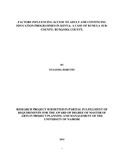| dc.description.abstract | This study aimed to investigate the factors that influence access to Adult and
Continuing Education, To determine the various influences the study will be guided by
the following study objectives: to determine how available learning and teaching
materials influence the access to Adult and Continuing Education , to assess how funding
influence access to Adult and Continuing Education ,to establish how learner economic
background influence access to Adult and Continuing Education and to investigate how
governmental policies influence access to Adult and Continuing Education Program in
Bumula sub-county. The study was conducted through descriptive research design. This
study is significant in improving the quality of adult and continuing education in order to
enhance access to the programme This study was limited by reluctance of respondents for
fear of victimization which was mitigated by developing of a rapport with respondents.
The scope of the study was adult education centers of Bumula sub-county. The target
population for the study was 150 respondents. The Sample size of 95 adult learners was
selected using simple random sampling while the 12 adult teachers were selected
purposively. The sample of 150 according to Krejcie & Morgan tables is 107. The
instruments for collection of data were questionnaires; both structured and open-ended.
Simple Random Sampling was employed to collect the data. Data was collected
randomly from Adult educators and adult learners in several Adult and Continuing
Education Program Institutions in Bumula Sub-county of Bungoma County. Data
collected was analysed using descriptive statistics and presented in frequency tables.
Concerning the influence of available learning and teaching materials and
implementation of adult and continuing education the bulky of respondents cited that
flexible class scheduling influenced access to adult and continuing education. The
findings showed that majority of the respondents felt that flexible class scheduling had a
strong influence on access to adult and continuing education as cited by 85.04%. It was
also revealed that economical and technological changes in the job market influenced the
access to adult and continuing education by 75.70% responses. On the basis of the
findings and conclusions above, the study recommended that the Government and other
stakeholders should ensure that qualified adult and continuing teachers are employed and
paid well to facilitate proper teaching process. The training centers’ need also to be well
equipped so as to meet both students and teacher educational needs. The study also
recommends that the government also needs to promote Literacy surveys and Curriculum
development that meets the needs of adult and continuing students. Training centers
should be situated near to the learner so as to encourage them to enroll into adult classes;
the fees for the programme should also be subsidized further to make it more affordable
to the learners. An effectual policy should be backed up by legislation so as to ensure its
full implementation and enable the concrete actions taken to bear fruit, for instance,
policies should take place within a political framework of real participatory democracy
and good governance of both National and local levels. The study also suggests a similar
study to be carried in other sub counties so as to compare the study findings. | en_US |

